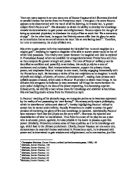Each time, Faustus decides to remain loyal to hell rather than seek heaven. In the Christian framework, this turning away from God condemns him to spend an eternity in hell. Only at the end of his life does Faustus desire to repent, and, in the final scene, he cries out to Christ to redeem him. But it is too late for him to repent. In creating this moment in which Faustus is still alive but incapable of being redeemed, Marlowe steps outside the Christian worldview in order to maximize the dramatic power of the final scene. Having inhabited a Christian world for the entire play, Faustus spends his final moments in a slightly different universe, where redemption is no longer possible and where certain sins cannot be forgiven.
The Conflict Between Medieval and Renaissance Values
Scholar R.M. Dawkins famously remarked that Doctor Faustus tells “the story of a Renaissance man who had to pay the medieval price for being one.” While slightly simplistic, this quotation does get at the heart of one of the play’s central themes: the clash between the medieval world and the world of the emerging Renaissance. The medieval world placed God at the center of existence and shunted aside man and the natural world. The Renaissance was a movement that began in Italy in the fifteenth century and soon spread throughout Europe, carrying with it a new emphasis on the individual, on classical learning, and on scientific inquiry into the nature of the world. In the medieval academy, theology was the queen of the sciences. In the Renaissance, though, secular matters took center stage.
Faustus, despite being a magician rather than a scientist (a blurred distinction in the sixteenth century), explicitly rejects the medieval model. In his opening speech in scene 1, he goes through every field of scholarship, beginning with logic and proceeding through medicine, law, and theology, quoting an ancient authority for each: Aristotle on logic, Galen on medicine, the Byzantine emperor Justinian on law, and the Bible on religion. In the medieval model, tradition and authority, not individual inquiry, were key. But in this soliloquy, Faustus considers and rejects this medieval way of thinking. He resolves, in full Renaissance spirit, to accept no limits, traditions, or authorities in his quest for knowledge, wealth, and power.
The play’s attitude toward the clash between medieval and Renaissance values is ambiguous. Marlowe seems hostile toward the ambitions of Faustus, and, as Dawkins notes, he keeps his tragic hero squarely in the medieval world, where eternal damnation is the price of human pride. Yet Marlowe himself was no pious traditionalist, and it is tempting to see in Faustus—as many readers have—a hero of the new modern world, a world free of God, religion, and the limits that these imposed on humanity. Faustus may pay a medieval price, this reading suggests, but his successors will go further than he and suffer less, as we have in modern times. On the other hand, the disappointment and mediocrity that follow Faustus’s pact with the devil, as he descends from grand ambitions to petty conjuring tricks, might suggest a contrasting interpretation. Marlowe may be suggesting that the new, modern spirit, though ambitious and glittering, will lead only to a Faustian dead end.







